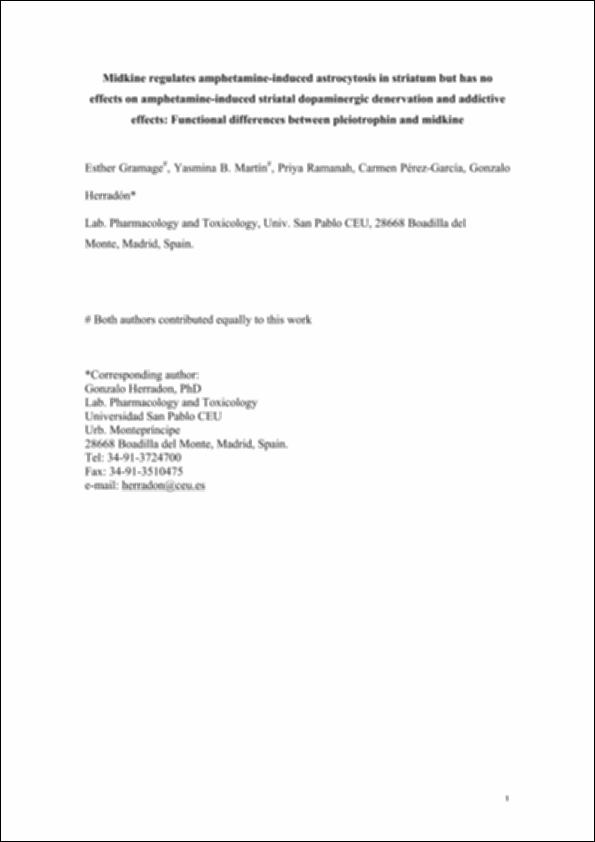Please use this identifier to cite or link to this item:
http://hdl.handle.net/10637/7111Midkine regulates amphetamine-induced astrocytosis in striatum but has no effects on amphetamine-induced striatal dopaminergic denervation and addictive effects : functional differences between pleiotrophin and midkine.
| Title: | Midkine regulates amphetamine-induced astrocytosis in striatum but has no effects on amphetamine-induced striatal dopaminergic denervation and addictive effects : functional differences between pleiotrophin and midkine. |
| Authors : | Gramage Caro, Esther Martín, Yasmina B. Ramanah, Priya Pérez-García, Carmen Herradón Gil-Gallardo, Gonzalo |
| Keywords: | Anfetaminas - Efectos secundarios.; RPTP β/ζ; TrkA; Fyn; pleiotrophin; neurotoxicity; drug abuse |
| Abstract: | Midkine (MK), a neurotrophic factor with important roles in survival and differentiation of dopaminergic neurons, is upregulated in different brain areas after administration of different drugs of abuse suggesting MK could modulate drugs of abuse-induced pharmacological or neuroadaptative effects. To test this hypothesis, we have studied the effects of amphetamine administration in MK genetically deficient (MK-/-) and wild type (MK+/+) mice. In conditioning studies, we found that amphetamine induces conditioned place preference (CPP) similarly in both MK-/- and MK+/+ mice. In immunohystochemistry studies, we found that amphetamine (10 mg/Kg, 4 times, every 2 h) causes a similar striatal dopaminergic denervation in both MK-/- and MK+/+ mice. However, we detected a significant increase of Glial Fibrillary Acidic Protein (GFAP) positive cells in the striatum of amphetamine-treated MK-/- mice compared to MK+/+ mice, suggesting an enhanced amphetamine-induced astrocytosis in absence of endogenous MK. Interestingly, the levels of expression of the MK receptor, Receptor Protein Tyrosine Phosphatase (RPTP) β/ζ, in the striatum were not found to be changed by the drug administration or the mouse genotype. In a similar manner the phosphorylation levels of RPTP β/ζ substrates with important roles in survival of dopaminergic neurons, Fyn kinase and TrkA, and of the MAP kinases ERK1/2, were unaffected by the drug or the genotype. The data clearly suggest that endogenous MK limits amphetamine-induced astrocytosis through Fyn-, TrkA- and ERK1/2-independent mechanisms and identify previously unexpected functional differences between MK and pleiotrophin, the only other member of the MK family of growth factors, in the modulation of effects of drugs of abuse. |
| Description: | Artículo en colaboración con: Yasmina B. Martín, Priya Ramanah, Carmen Pérez-García, Gonzalo Herradón En: Neuroscience. ISSN 0306-4522. n. 190 (2011), p. 307-317 |
| URI: | http://hdl.handle.net/10637/7111 |
| Rights : | http://creativecommons.org/licenses/by-nc-nd/4.0/deed.es |
| Issue Date: | 2011 |
| Center : | Universidad San Pablo-CEU |
| Appears in Collections: | Facultad de Farmacia |
Items in DSpace are protected by copyright, with all rights reserved, unless otherwise indicated.


